
Professional English_Law
.PDF
1 Legal systems
The structure of the law
T h e legal s y s t e m i n t h e U n i t e d K i n g d o m ( U K )
The study of law distinguishes between public
l a w |
and |
p r i v a t e l a w , |
but in legal practice in |
||
the |
UK |
the distinction |
between civil |
l a w and |
|
c r i m i n a l l a w is |
m o r e |
important to |
practising |
||
lawyers. |
Public |
law relates to the state . It is |
|||
concerned w i t h |
laws which govern |
processes |
|||
in local and national g o v e r n m e n t and conflicts |
|
b e t w e e n the individual and the state in areas |
|
such as immigration and social security. |
|
Private law is concerned w i t h the relationships |
|
between |
legal p e r s o n s , t h a t is, individuals |
and corporations, and includes family law, |
|
contract |
law and property law. Criminal law |
deals with certain |
f o r m s of c o n d u c t for which |
the state r e s e r v e s |
p u n i s h m e n t , for example |
m u r d e r and theft . |
The s t a t e prosecutes t h e |
o f f e n d e r . |
Civil |
law concerns |
relationships |
between |
private |
persons, their |
rights, and |
their duties. It is also concerned with conduct
which may give rise to a |
c l a i m |
by a legal |
person for c o m p e n s a t i o n |
o r a n |
i n j u n c t i o n |
- an order m a d e by the court . However, each
field of |
law |
tends |
to |
overlap with others. For |
||||||
e x a m p l e , |
a |
road |
accident case |
m a y lead |
to a |
|||||
criminal |
prosecution |
as well |
as |
a civil action |
||||||
for |
compensation . |
|
|
|
|
|||||
S u b s t a n t i v e |
l a w |
creates, |
defines |
or |
||||||
r e g u l a t e s |
rights, |
liabilities, |
and d u t i e s |
|||||||
in |
all |
areas |
of |
law |
and is |
contrasted |
with |
|||
p r o c e d u r a l |
|
l a w , |
which defines the procedure |
|||||||
by which a |
l a w is to be e n f o r c e d . |
|
||||||||
The constitution
The h e a d of s t a t e is the monarch, currently the Queen in the UK, but the government carries the authority of the Crown (the monarch) . The
Westminster Parliament |
has |
t w o c h a m b e r s : |
the House of Lords and the House of Commons, |
||
which sit separately |
and |
are constituted |
on different principles. The Commons is an elected body of members . Substantial reform
is being carried out in the u p p e r house, the
House of Lords, where it is proposed that the
majority |
of m e m b e r s be a p p o i n t e d , with a |
|||
minority |
e l e c t e d , |
replacing |
the hereditary |
|
peers. There is no |
w r i t t e n constitution, |
but |
||
constitutional l a w |
consists |
of statute |
l a w, |
|
c o m m o n law , an d constitutional conventions .
Jurisdiction
There are |
four countries |
and |
three |
distinct |
||
j u r i s d i c t i o n s in the United K i n g d o m : |
England |
|||||
and |
Wales, |
Scotland, and |
Northern |
Ireland. |
||
All |
share a |
l e g i s l a t u r e |
in |
the |
Westminster |
|
Parliament for the making of new laws and
have a c o m m o n |
law |
tradition, |
but |
each |
has |
||||
its own |
h i e r a r c h y of c o u r t s , |
legal |
rules |
and |
|||||
legal |
profession. Wales a n d |
Northern Ireland |
|||||||
each |
have their |
o w n A s s e m b l y |
|
and since |
|||||
1999 |
|
Scottish |
M e m b e r s |
of |
P a r l i a m e n t |
||||
(SMPs) |
have sat |
in |
their |
own |
Parliament. |
||||
U n d e r an Act o f the |
Westminster |
Parliament, |
|||||||
the Scottish Parliament has power to legislate on any subject not specifically r e s e r v e d to the Westminster Parliament such as defence or foreign policy. The UK's accession to the
European Communities in 1973, a u t h o r i s e d
by the European Communities Act 1972, has
meant the |
addition |
of |
a f u r t h e r legislative |
|
a u t h o r i t y |
in |
the legal |
system . The UK is also |
|
a s i g n a t o r y |
of the |
European C o n v e n t i o n of |
||
Human Rights and this has been i n c o r p o r a t e d into UK law.

1.1Complete the definitions. Look at A opposite to help you.
1 |
is law relating to acts committed against the law which |
|
are punished by the state. |
2 |
is concerned with rhe constitution or government or rhe |
|
state, or the relationship between state and citizens. |
3 |
is rules which determine how a case is administered by the |
|
courts. |
4 |
is concerned with the rights and duties of individuals, |
organisations, and associations (such as companies, trade unions, and charities), as opposed to
criminal |
law. |
5 |
is common law and statute law used by the courts in |
making |
decisions. |
1.2Complete the sentences. Look at В and С opposite to help you. There is more than one possibility for one of the answers.
1 In many systems a president rather than a monarch is
2 |
The UK system has a parliament with two |
|
|
3 |
As in other countries, the courts are organised in a |
of levels. |
|
4 |
The Scottish Parliament has the |
ro legislate on subjects not reserved to |
|
|
Westminster. |
|
|
5 |
The EC is an important legislative |
|
in most European countries. |
6 |
A number ot international |
have been incorporated into national law. |
|
1.3Complete the table with words from А, В and С opposite and related forms. Put a stress mark in front of the stressed syllable in each word. The first one has been done for you. Then complete the sentences below with words from the table.
Verb |
Noun |
Adjective |
|
|
|
|
'constitute |
consti'tution |
consti'tutional |
|
|
|
legislate |
|
|
|
|
|
|
|
|
|
|
proceed |
|
|
|
|
|
|
|
|
|
|
|
convene |
|
|
|
|
|
|
|
|
|
|
|
|
|
regulation |
|
|
|
|
|
|
|
|
|
accede |
|
|
|
|
|
|
|
|
|
|
|
elect |
|
|
|
|
|
|
|
|
|
|
|
authorise |
|
|
|
|
|
|
|
|
|
|
|
1 |
The |
is the body which has the function of making law; normally it is the |
|||
|
Parliament. |
|
|
|
|
2 |
It is quite a lengthy process to |
to the European Community. |
|
||
3 |
Sometimes a court case can be delayed while counsel argue over |
problems. |
|||

2 Sources of law: legislation
Background to making new law
How are laws made in the UK?
The predominant sources of law in the United Kingdom are;
•primary legislation, known as Acts of Parliament or statutes, which begin life as drafts called Bills (see В and С below);
•secondary or delegated legislation, such as statutory instruments, bye-laws, and professional regulations.
A new Act is passed in order to:
•update or amend existing legislation;
•legislate for new circumstances and enforce government policies;
•ensure UK compliance with International or European Union (EU) Law;
•consolidate laws by bringing together into one statute all the existing statutes on one topic;
•codify rules by bringing together all the case law and statutes on a particular subject where the principles are established.
Parliament can enact any law it chooses or repeal obsolete laws which are no longer relevant, and the courts must enforce it. The exception to this is EU law.
Note: Act of Parliament and Bill are always capitalised in legal usage; statute is not. Statutory instruments are delegated legislation created by government ministers. Bye-laws are made by Local Government or public bodies.
BrE: an Act; AmE: a Bill
Early development of a Bill
The government may proceed to initiate a consultative process by the publication of a Green Paper in which its proposals are set out at an early stage with the intention of attracting public response and comment. The government's White Papers contain their more definite proposals, although these are often
published following consultation or discussion with pressure groups, professional bodies, or voluntary organisations. A Bill does not have to be preceded by a White or Green paper, although it may have been presented for public scrutiny, that is, examination, in draft form earlier.
Passing an Act
All Acts must be submitted to both Houses of Parliament in the draft form of a Bill. The
legislative process |
involves |
three readings |
in both Houses. At |
the first |
reading, the title |
is read to Members of Parliament (MPs); at the second reading, MPs debate proposals. Then a standing committee will scrutinise the provisions in the Bill and may amend it to ensure that it enshrines the principles debated and approved at the second reading. This is reported back to MPs. At the third reading, the Bill is re-presented. The Bill then goes through readings in the upper house. The actual
drafting of the legislation is undertaken by Parliamentary Counsel. Finally, a Bill must receive Royal Assent from the monarch before it becomes law on a specified date. In fact, this stage has been reduced to a formal reading of the short title of an Act in both Houses of Parliament and is now a formality.
Government Bills are introduced by the Government; Private Members Bills are proposed by MPs. Both methods may result in Public Acts that govern the general public. Private Acts affect particular individuals or institutions.
Note: No article (a/the) is necessary in to become law.
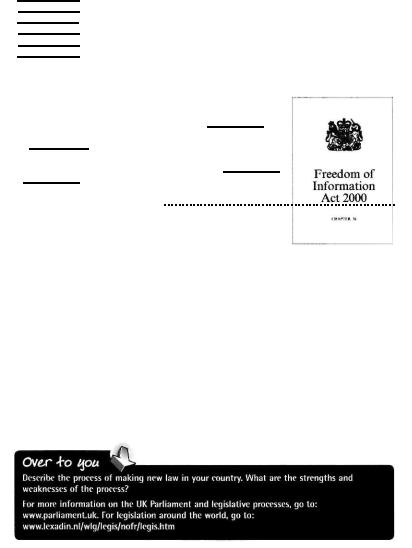
2.1 Find verbs in A opposite that can be used to make word combinations with the words below. There is more than one possibility for three of the answers.
Parliament can
1Acts of Parliament.
2new statutes.
3existing legislation.
4obsolete law.
5statute law, case law, and amendments into one Act.
6law by repealing and re-enacting in one stature provisions of a number of
statutes on the same subject.
2.2 Complete the sentences. Look at А, В and С opposite to help you. Pay attention to the grammatical context.
1An order made under authority delegated to a government minister by an Act of Parliament is known as a
2 |
A |
is made by a local authority or a public or |
|
nationalised body and has to be approved by central government. |
|
3 |
Charities like Oxfam and Help the Aged can act as |
|
|
, |
lobbying for law reform, |
4The Committee needs to ensure the Bill incorporates the principles agreed so they check it by
An Act of Parliament
2.3 A visiting Russian colleague is asking an English solicitor about the legislative process. Replace rhe underlined words in their conversation with alternative words from С opposite. Pay attention to the grammatical context. There is more than one possibility for two of the answers.
Natasha: How is new legislation enacted?
Charles: Well, initially the (1) draft legislation has to be (2) presented to both houses. The draft is (3) discussed several times. A committee has the job of checking that the Bill (4) incorporates the fundamental elements (5) agreed at the second reading. After this, the Bill is (6) shown again to the lower house.
Natasha: Who docs the (7) formal writing of the legislation?
Charles: It's (8) done by qualified barristers employed as civil servants, known as Parliamentary Counsel.
Natasha: Who can (9) put forward Bills?
Charles: The government and, less commonly, MPs.

3 The court system
A Civil courts
Duncan Ritchie, a barrister, is talking to a visiting group of young European lawyers.
'Both criminal and civil courts in England and Wales primarily hear evidence and aim to determine what exactly happened in a case. Broadly speaking, the lower courts decide matters of fact and the upper courts normally
deal with points of law. In England, simple civil actions, for example family matters such as undefended divorce, are normally heard in either the Magistrates' Courts or the County Courts.
Judges have different titles depending on their experience, training, and level. A single stipendiary magistrate or three lay magistrates sit in the Magistrates' Court. There's no jury in a Magistrates' Court. Family cases may go on appeal from the Magistrates' Court to the County Courts. The County Court also hears complex first instance civil cases, such as contract disputes, compensation claims, consumer complaints about faulty goods or services, and bankruptcy cases. Claimants, previously referred to as plaintiffs, may seek a legal remedy for some harm or injury they have suffered. There are circuit judges and recorders who sit in the County Courts, usually without a jury. Juries are now rare in civil actions, so normally the judge considers both law and fact.
More complex civil cases, such as the administration of estates and actions for the recovery of land, are heard in the High Court of Justice, which is divided into three divisions: family, Chancery and Queen's Bench. The court has both original, that is, first instance, and appellate jurisdiction. From the High Court cases may go on appeal to the civil division of the Court of Appeal, which can reverse or uphold a decision of the lower courts. Its decisions bind all the lower civil courts. Civil cases may leapfrog
from the High Court to the House of Lords, bypassing the Court of Appeal, when points of law of general public importance are involved. Appellants must, however, apply for leave to appeal. Decisions of the House of Lords are binding on all other courts but
not necessarily on itself. The court of the House of Lords consists of twelve life peers appointed from judges and barristers. The quorum, or minimum number, of law lords for an appeal hearing is normally Three, but generally there is a sitting of five judges.'
Note: A stipendiary is a full-time paid magistrate who has qualified as a lawyer. A lay magistrate is unpaid and is an established member of the local community.
A circuit is a geographical division for legal purposes; England and Wales are divided into six. A recorder is a part-time judge with ten years standing as a barrister or solicitor.
.
B Criminal courts
"About 95% of all criminal cases in England and Wales are tried in the Magistrates' Courts, which deal with petty crimes, that is, less serious ones. In certain circumstances, the court may commit an accused person to the Crown Court for more severe punishment, either by way of a fine or imprisonment. Except in cases of homicide, children under 14 and young persons - that is, minors between 14 and 17 years of age - must always be tried summarily, meaning without a jury, by a Youth Court. A Youth
Court is a branch of the Magistrates' Court. Indictable offences, that is, more serious ones such as theft, assault, drug dealing, and murder, are reserved for trial in the Crown Court. In almost all criminal cases, the State, in the name of the Crown, prosecutes a person alleged to have committed a crime. In England and Wales, a jury of twelve people decides whether the defendant is guilty of the crime she or he is charged with. The Crown Court may hear cases in circuit areas. From the Crown Court, appeal against conviction or sentence lies to the Criminal Division of the Court of Appeal. If leave to appeal is granted by that court, cases may go on appeal to the House of Lords."
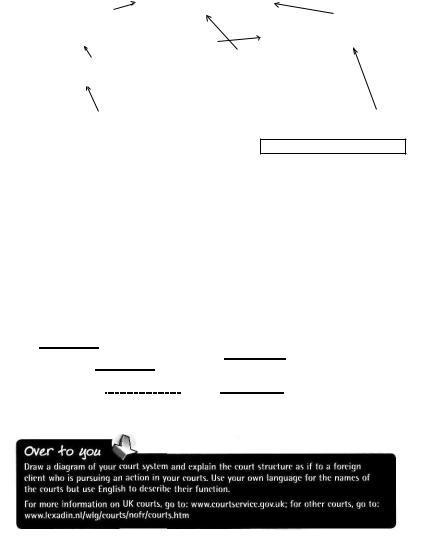
3.1Complete the diagram. Look at A and В opposite to help you.
The Court System in England and Wales
|
CRIMINAL CASES |
|
|
|
CIVIL CASES |
|
||||||||
|
|
|
|
|
|
|
|
|
|
|
|
|
|
|
Appeals may sometimes go to |
|
The (7) ......................... |
|
of Lords |
|
|
||||||||
|
|
|
|
|
|
|
|
|
|
|||||
|
|
|
|
|
|
|
|
|
|
|
|
|
|
|
|
The Court of Appeal |
|
|
|
|
|
|
|
|
|
.......................The Court of (6) |
|
||
|
(Criminal Division) |
|
|
|
Appeals usually go to |
|
|
|
|
|
(Civil Division) |
|||
|
|
|
|
|
|
|
|
|
|
|
|
|
|
|
|
|
|
|
|
|
...........................or may (5) |
|
to |
|
|||||
|
Appeals go from here to |
|
|
|
|
|
|
|
|
|
|
|||
|
|
The (4) |
............. ............. ............. |
|
|
|||||||||
|
|
|
|
|
|
|
|
|||||||
|
The Crown Court |
|
|
|
|
Queen's Bench Division |
|
|
|
|
|
|
||
|
|
|
|
|
|
|
|
|||||||
|
|
|
|
|
|
|
||||||||
|
|
|
|
|
|
|
|
|
|
|
|
|
||
|
|
|
|
|
|
|
|
|
|
|
|
|
||
|
|
|
|
|
|
Chancery Division |
|
|
||||||
|
Appeals go from here to |
|
|
|
|
|
Appeals may leapfrog from here to |
|||||||
|
|
|
|
|
|
|||||||||
|
|
Family (3) |
|
|
|
|||||||||
|
|
|
|
|
|
|
|
|
|
|
|
|
|
|
|
.............. ...............The (1) |
|
|
|
|
|
|
|
The County Court |
or |
||||
The Court of First (2) .....................
3.2Complete the table with words from A and В opposite and related forms. Put a stress mark in front of the stressed syllable in each word. The first one has been done for you.
Verb |
Noun - event |
Noun -- person |
|
|
or action |
|
|
'sit |
'sitting |
NO |
|
|
|
|
|
appeal |
|
|
|
|
|
|
|
hear |
|
NO |
|
|
|
|
|
try |
|
NO |
|
|
|
|
|
claim |
|
|
|
|
|
|
|
3.3Match the two parts of the sentences and complete the gaps with words from the table above. Pay attention to the grammatical context. There is more than one possibility for three of the gaps.
1 |
The |
courts can |
a |
a court of first instance. |
|
2 |
An appellant must get |
b |
normally |
in the Crown Court. |
|
3 |
In a civil action, a |
|
who с |
reverse or uphold decisions of lower courts. |
|
|
has suffered |
|
d |
harm or injury seeks a remedy. |
|
4 |
Magistrates generally |
e |
leave to |
before taking a case to |
|
|
cases of petty crime as |
|
a higher court. |
|
|
5 |
Indictable offences are |
|
|
|
|
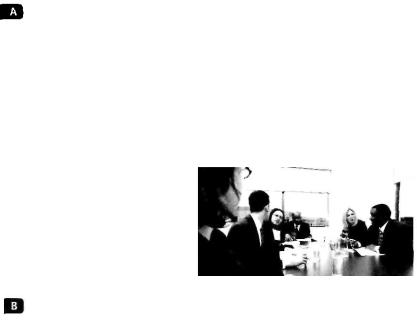
4 Working lives
A company commercial lawyer
Sophie Brettle is talking about her work at Melton Deans.
'I'm a partner in a medium-sized regional law firm, working within the Company Commercial Department. I head up a team of eight, comprising six lawyers and two paralegals - legal researchers - undertaking projects work for Public Sector clients. Our main client is a Government Department. We're instructed by them to advise and act on Private Finance Initiative Projects, also known as the PFI. This involves negotiating with a number of other parties comprising the funders, the building contractors, and facilities management and ensuring that the client's aims and objectives are met and their best interests protected.
A significant proportion of my time is spent in all parties meetings. As these transactions are complex, and the meetings are attended by all sides and their legal advisers, I have to make sure comprehensive notes are taken by an assistant solicitor. Following a meeting, documents reflecting the terms agreed are prepared
and circulated for approval.
Within the practice, I'm a member of |
|
the Executive Committee and have |
|
responsibility for aspects of financial |
|
management within the department. I |
|
also deal with recruitment, training, and |
|
development within the department. |
|
During a working day as a fee earner, |
|
I have to combine my chargeable work |
|
for clients with administrative duties' |
An all parties meeting |
A legal secretary
An assistant solicitor is instructing Marie Lapotaire, the Commercial Department's legal secretary:
Solicitor: I've just sent you some sound files with the minutes on from yesterday's
|
meeting. Is there any way you can type those up before anything else? I know |
|
you've got a substantial amount of work at the moment. |
Marie: |
No problem. Do you want me to circulate them by email as soon as I've |
|
finished, get a hard copy and put it on the file? |
Solicitor: Please. I'm going to be running between meetings for a large part of the day
|
but if I get a minute, I'll have a quick look at the hard copy and mark it up |
|
with any changes. Don't wait for me to do that before getting the draft out |
|
- there are action points that the paralegals need to be getting on with. |
Marie: |
Fine, I'll copy everyone in. Anything else? I've put all the documentation for |
|
Project Angel on your desk. I don't know if it's ready to go out yet? |
Solicitor: I saw that, thanks. No, I need to make sure that the client is happy with the
|
latest clauses the funder wants. Also, I think they may have negotiated more |
|
concessions so I'll have to get back to you on those. |
Marie: |
OK. By the way, I think your out of office message is still on, although the |
|
date's wrong. Don't worry, I'll change it. Your calls are still coming through to |
|
my phone so I'll carry on taking messages. |
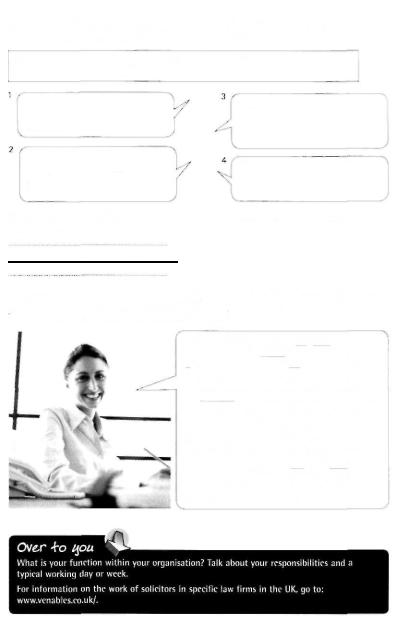
4.1Макe word combinations from A opposite using words from the box. Then use appropriate word combinations to complete Sophie Brettle's sentences below.
fee |
terms |
interests |
work |
comprehensive |
best |
chargeable |
notes |
meeting |
earner |
agreed |
all parties |
|
|
|
|
|
|
I don't think we can accept that
clause. It's not in the ....................
....................... of the client.
Marie, can you go ahead and set up the next ....................
......................... ....................?
We need everyone to be there.
Will you check the ...........................
........................ match the notes taken from the meeting with the contractors and client?
We can't spend any more time
on this. It's not ........................
.................................. .
4.2Find three expressions in A and В opposite which can be used in the combinations below to mean 'a lot of '.
my time / my week / my workload
4.3Marie I.apotaire is talking about her working day. Replace the underlined words and phrases with alternative words and phrases from В opposite. Pay attention to the grammatical context. There is more than one possibility for one of the answers.
In addition to typing up (1) recorded notes from meetings, (2) sending a copy to everyone by email, and (3) printing off emails, most days I'll be given various other tasks to carry out, such as document generation. If the solicitor
(4) indicates changes on a draft text, I'll (5) word process them. I sometimes have to get addresses and contact details from the Internet and make appointments for meetings or conference calls. Obviously, I also take incoming calls when the fee earners aren't available and I let the caller know the solicitor will {6) call them back. I'll also
(7) continue with any other tasks she's given me. Once a month I attend the secretarial committee as the representative for my department.

5 A law firm's structure and practice
A law firm's structure and practice
Anchor Robbins, a large UK law firm, is submitting a tender for the provision of legal services to a local authority . In the first section of the tender document, the firm's Structure and breadth of expertise is set out. Typically, descriptions of law firms' practice areas and expertise are in strongly positive language.
1 ANCHOR ROBBINS'RESOURCES AND EXPERTISE
1.1 General Details
Personnel
282 personnel including 38 partners. 62 solicitors,
12 other lawyers, 14 legal executives, and 10 trainee solicitors, in addition to clerical, secretarial, and support staff.
Structure
Wc have three specialist areas:
Commercial Property incorporates Public Sector, Construction, Planning and Environment. Company Commercial comprises Banking, Project Finance, Procurement, Employmcnt and Pensions.
Private Client offers Wills, Trusts and Probate, Tax Planning, and Residential Conveyancing.
Dedicated specialist dispute resolution services are provided within each of the respective areas.
Services
We provide all the services you require. The head of our Projects team, Jan Stephenson, will lead the team providing legal services to you.
1.2 Professional Indemnity Insurance
We have provided full details of our current professional indemnity cover in our PreQualification Questionnaire (PPQ) The terms of our cover are reviewed annually.
1.3 Resources and Specialist Knowledge
Expertise and Structure:
Each of our departments contains specialist partner-led teams ensuring that wc are able to resource high quality specialist knowledge and provide a comprehensive service to our clients. Further details of our Projects Team are set out at
(3) below.
Commitment:
We are committed to anticipating our clients' needs and meeting them. Fundamental to this is the commitment of each team leader lo understand thoroughly the priorities and business of our clients.
Information Technology:
We have made significant investment in our information technology systems in order to give the support and resources that our lawyers need. Our systems enable us to transfer know-how into a searchable database using links to cases and legislation, to monitor workloads, measure outputs, and plan ahead more effectively. The stability and security of our system is of particular importance to our clients and to us.
Projects at Anchor Robbins:
The Projects team is headed up by Jan Stephenson and brings together specialists in infrastructure, construction, energy, planning, and public sector. The team are able to draw on relevant expertise from elsewhere in the firm when required and have exclusive access to a dedicated Professional Support Lawyer.
The team have had extensive experience in handling PFI (Private Finance Initiative) since its very beginning and have been involved in a considerable range of accommodation projects including schools, hospitals, courts, and light rail projects.
Note: legal executives are qualified to assist solicitors but do not practise as solicitors. procurement - procedures, which may include use of a PPQ, by which public authorities award contracts for the provision of public works, supplies, and services in accordance with rules and regulations.
Private Finance Initiative (PFI) - collaboration between government and private sector companies to fund and develop major public infrastructure such as roads, schools, and hospitals.
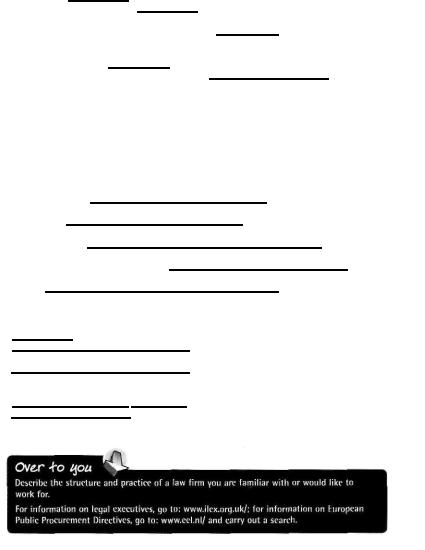
5.1Complete the sentences with verbs from A opposite. Pay attention to the grammatical context. There is more than one possibility for all of the answers.
1 |
The company |
a wide range of services to international corporate clients. |
||
2 |
Rattigan's employment practice |
six partners, 14 associates and 11 other legal |
||
|
and support staff. |
|
|
|
3 |
Our outstanding commercial litigation |
practice area |
insurance and reinsurance |
|
|
litigation, securities and commodities disputes, partnership law, bankruptcy, and business |
|||
|
torts. |
|
|
|
4 |
Our finance department |
|
lawyers who excel in cross-border transactions. |
|
5 |
Our experienced mergers and acquisitions team is |
Miguel Ortiz, |
||
|
who graduated in law at the University Complutense in Madrid and gained his LLM from |
|||
|
ESADE. |
|
|
|
5.2Find verbs in A opposite that can be used to make word combinations with the phrases in the box. More than one verb may sometimes be possible. Then use appropriate word combinations to complete the sentences below. Pay attention to the grammatical context.
|
relevant expertise |
exclusive access |
extensive experience |
|
|
a comprehensive service |
significant investment |
specialist knowledge |
|
|
|
|
|
|
1 |
The litigation team |
|
in handling complex |
|
|
international disputes. |
|
|
|
2 |
Our firm has |
|
in knowledge management systems, |
|
|
enabling staff to access an extensive database. |
|
|
|
3 |
Clients arc able to |
|
|
from dedicated |
|
teams in each practice area. |
|
|
|
4 |
Due to the expertise of our sraff we can |
|
in |
|
|
commercial litigation in a number of jurisdictions. |
|||
5 |
We can |
|
to domestic and |
|
|
multinational clients, with particular expertise in corporate and finance. |
|||
5.3Complete the definitions. Look at A opposite to help you.
1 |
- staff |
2 |
- put in a formal proposal to win a contract with |
|
an estimate of the cost |
3 |
- insurance to protect your business against |
|
compensation sought by a client for harm or damage caused by mistake or negligence by an |
|
employee of your firm |
4 |
- move specialist knowledge |
5 |
- evaluate work done |
